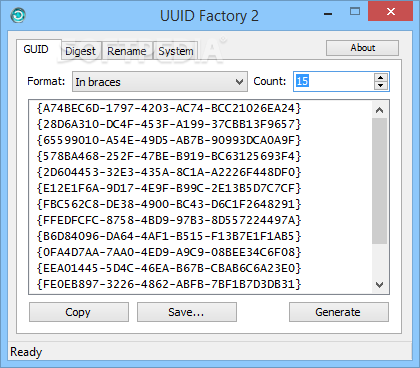
When the UUID is inserted into the text, this setting controls whether the pasted value is marked as selected ( true) or whether the selection is cleared ( false) Whether the hex digits are forced to uppercase ( true) or lowercase ( false) Whether the Insert new UUID function is available from the editor context menu See the release notes for more information. The extension can also generate a nil UUID, where all the digits are 0. The generated UUIDs are type 4, variation 1, which means unique based on random numbers.

It will insert the UUID at the location of the caret in the current active editor, replace any existing text selection if there is one, and generate multiple UUIDs and insert them all when a multi-cursor selection is active. This extension works as expected when inserting a new UUID into the active text editor. Through configuration settings, it is possible to wrap the created UUID with braces or quotes when it is created, for example: Insert a new 'nil' UUID (where all the digits are 0).The other way to run the commands is from the command palette by pressing ( Ctrl+Shift+P or Cmd+Shift+P on Mac), typing UUID and selecting the desired function. By default, the keyboard binding is Alt+Shift+U. The Insert new UUID function is available from the editor context menu, or as a keyboard binding. This extension supports creating a new version 4 UUID and then either adding it to the current location in the active editor, or placing it on the clipboard.
#UUID GENERATOR WINDOWS WINDOWS#
One useful case for this extension is to create UUIDs for configuring new profiles for Windows Terminal. Uuid.This extension generates Universal Unique Identifier (UUID) values and will either insert them into the current active editor, or place them on the clipboard. Uuid.v5buffer(Uuid.NAMESPACE_URL, 'myBuffer, offset: 16) Įxample: UuidValue usage uuidValue = uuid.v5obj(Uuid.NAMESPACE_URL, '// -> UuidValue(uuid: "c74a196f-f19d-5ea9-bffd-a2742432fc9c") Uuid.v5buffer(Uuid.NAMESPACE_URL, 'myBuffer) V5obj() Returns a UuidValue, which has a validation check and some internal functions wrapping the string.Įxample: Generate string UUID with fully-specified options uuid.v5(Uuid.NAMESPACE_URL, '// -> "c74a196f-f19d-5ea9-bffd-a2742432fc9c"Įxample: Generate two IDs in a single buffer var myBuffer = new List(32) V5() returns a string representation of the uuid. Offset - (Number) Starting index in buffer at which to begin writing. Returns if you want a v4 generated namespace (true) or NAMESPACE_NIL (false) randomNamespace - (Boolean) Default True.Options - (Map) Optional uuid state to apply. Uuid.v5(Uuid.NAMESPACE_URL, '// -> 'c74a196f-f19d-5ea9-bffd-a2742432fc9c'ĪPI # Uuid() -> UuidValue # uuid.v5buffer(String namespace, String name, List Generate a v5 (namespace-name-sha1-based) id : (you can use 'any' instead of a version if you just want the latest always) dependencies: If you wish to run tests, go into packages/dart-uuid/ and run 'dart test/uuid_test.dart'.In your pubspec, add an entry for dart-uuid to your dependencies (example below).Open a command line and cd to your projects root folder.




 0 kommentar(er)
0 kommentar(er)
